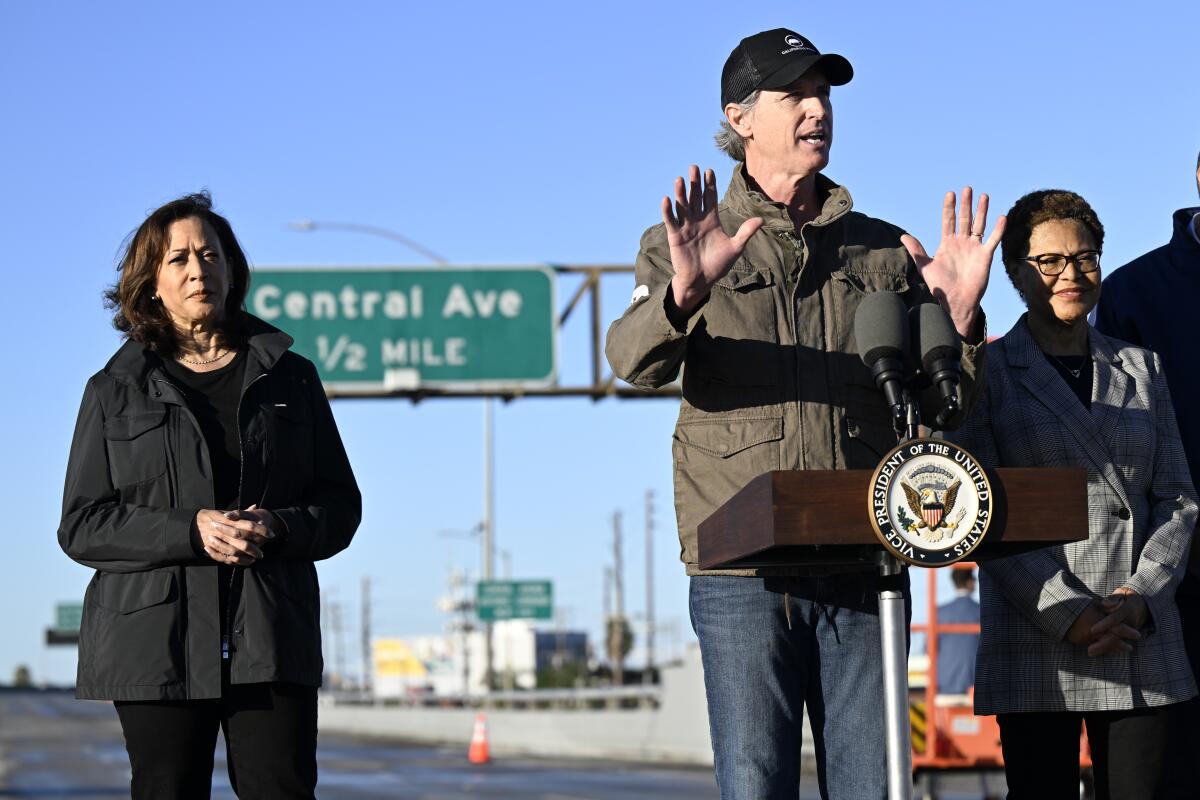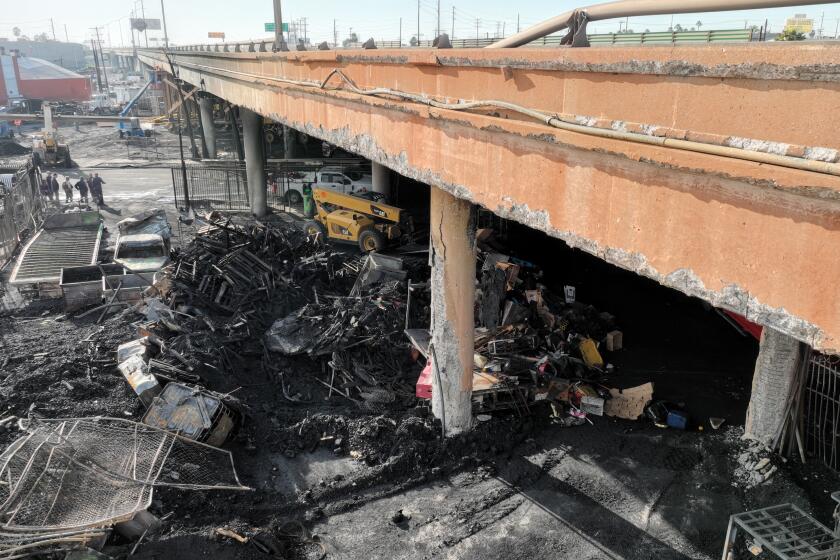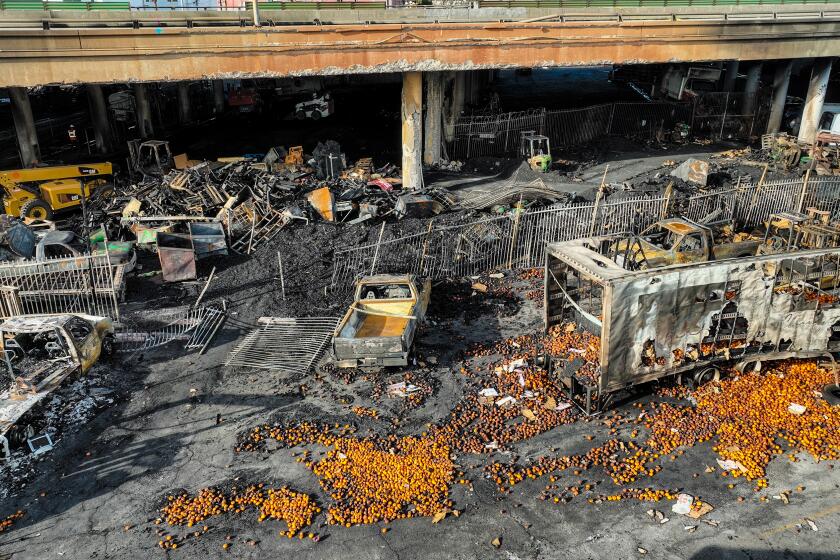Newsom responded quickly, and very publicly, to L.A. freeway fire but still faces scrutiny

Gov. Gavin Newsom got his victory lap.
Sporting a brown jacket, jeans and a baseball cap as he stood on the 10 Freeway, the governor announced Sunday morning that all lanes of the roadway would reopen weeks earlier than he originally estimated after a massive fire shut down a main artery through downtown Los Angeles.
Southern California’s traffic nightmare ended later that evening, days before the heavily traveled Thanksgiving holiday.
“This is about pride,” Newsom said at a news conference with Vice President Kamala Harris, U.S. Sen. Alex Padilla and Los Angeles Mayor Karen Bass. “It’s about government getting things done.”
The Newsom administration still faces questions as the landlord of the parcel where the fire ignited and engulfed the underbelly of a major metropolitan freeway. The crisis provided Newsom a chance to bat down criticism of being overly enchanted by the national political stage as he raced to fix a high-profile California problem, but the fire could present a political vulnerability for the governor if it turns out that stronger state oversight could have prevented the blaze.
Newsom’s announcement came less than two weeks after a poll showed his standing among California voters had hit a low, a drop in popularity that followed a year of the governor traveling to the Deep South, including Florida, and other corners of the country to attack conservative policies on abortion, immigration and LGBTQ+ rights being trumpeted by Republican governors and to rally support for President Biden. The poll’s director blamed, in part, Newsom’s focus outside the state.
The governor had just returned from a whirlwind trip to Israel and China when a suspected arsonist lighted a fire under the freeway and shut down a crucial section of the 10.
Newsom proclaimed a state of emergency later that evening and the next day held his first of several news conferences in Los Angeles. Under a “Fix the 10” tagline, his office emailed journalists daily progress reports on the work being done ahead of the original three- to five-week timeline to make the repairs. Newsom also set up a camera at the site to stream live video of the work being done.
“Newsom is not foolish about wrecking or missing opportunities for a tremendous amount of news coverage,” said Joseph S. Tuman, an emeritus professor of political and legal communications at San Francisco State University. “I think he’s waded right into this as quickly as he could because he wants to be seen.”
Bass commended Newsom last week for traveling back and forth to Los Angeles from San Francisco, where he participated in a gathering of political and business leaders from around the world.
“Managing the world, but being here for Angelenos,” Bass said. “It’s the kind of leadership that we have needed in the state to make sure that those stars are aligned.”
Questions have been raised about why the Newsom administration didn’t appear to enforce a policy the California Department of Transportation adopted in 2018 to prevent this type of fire in the aftermath of a similar incident in Atlanta.
Assemblymember Miguel Santiago (D-Los Angeles) praised the governor’s response to the fire. He said he felt confident that after an internal review the Newsom administration would provide more information about state oversight of its leased-out parcels to put “strong accountability mechanisms in place to prevent anything like this from ever happening again.”
“It should have never happened,” Santiago said. “I mean, there’s already protocols in place.”
The fire was reported early Nov. 11 after a pallet yard under the 10 Freeway caught fire, damaging the overpass and leaving officials scrambling to figure out how to safely reopen the roadway as soon as possible.
Caltrans routinely inspected the site where the fire broke out and last visited Oct. 6. The company that rented the land from Caltrans said it’s being scapegoated.
Newsom and Bass drew a parallel to 1994, when Republican Gov. Pete Wilson pushed contractors to work around the clock to repair the Santa Monica Freeway after the Northridge earthquake knocked down two sections of the roadway.
Joseph Rodota said that as then-Cabinet secretary he recognized the situation as pivotal for Wilson.
“I remember thinking at the time, you know this is when people are going to see Pete Wilson,” Rodota said of his call with Caltrans. “This is his moment.”
At the urging of his friends at the Hoover Institution, Wilson offered contractors a $200,000 bonus for each day the project finished ahead of schedule. He set a similar $200,000 penalty for each day the work was late. The chosen contractor, C.C. Myers Inc., finished the project 74 days early and made a $14.5-million bonus.
Seeing an opportunity to boost their reelection bids, Wilson and then-President Clinton tussled over who should be allowed to take credit for the success. Wilson rushed to reopen the freeway on his own in April, hours before Vice President Al Gore landed in Los Angeles to represent the Clinton administration.
Wilson’s handling of the event played into his campaign narrative as a competent problem solver. The governor, who had been in a political slump before the earthquake, beat Democrat Kathleen Brown with 55% of the vote in California’s 1994 gubernatorial race.
Less than three months after the Northridge earthquake knocked down two sections of the world’s busiest thoroughfare, Gov.
Well into in his second term, Newsom doesn’t need to convince California voters to elect him as governor again. The crisis falls at a time when the Democratic governor is raising his profile nationally and spending more time outside California as he waits in the wings of the 2024 presidential contest.
News about Newsom’s drop in popularity hit shortly after he returned to his home state from overseas: 49% of California voters disapproved of his performance as governor, compared with 44% who approved, according to a UC Berkeley Institute of Governmental Studies survey co-sponsored by the Los Angeles Times.
Berkeley pollster Mark DiCamillo blamed some of Newsom’s dip in popularity on his decision to take a more prominent role in national politics when the state’s biggest problems, such as homelessness and housing affordability, remain challenges for Californians. Democrats nationally, including Biden, have also seen their poll numbers drop as inflation and two major wars deepen a sense of unease among Americans.
Newsom’s aides pushed back on his low marks, arguing that other polls showed the governor faring better than in the Berkeley survey.
“I disagree with the concept that you can’t walk and chew gum,” said Erin Mellon, a spokesperson for the governor. “I think he can do both. I think he is focusing on California when he is talking about climate with the Chinese. I think he is focused on California when he is working on cleaning up encampments. I think he is focused on California when he’s responding to wildfires and I think he’s focused on California when he’s looking at a major artery that affects the second-largest city in the nation.”
Newsom will leave California again at the end of the month to debate GOP presidential candidate Gov. Ron DeSantis of Florida about their two different visions for America: The progressive California model or the conservative Florida way. Newsom challenged DeSantis to debate him for months before the Florida governor finally agreed to a Nov. 30 date.
Newsom last week crammed debate preparation sessions between news conferences in Los Angeles and appearances at the Asia-Pacific Economic Cooperation conference in San Francisco. After meeting with Canadian Prime Minister Justin Trudeau and introducing Kamala Harris at an APEC welcome event, the governor returned to Los Angeles on Thursday to continue his prominent role in the 10 Freeway response.
Though Tuman and others commended Newsom’s presence in Los Angeles, they cautioned that the governor needs to be careful with his words.
Newsom announced that the cause of the fire was arson before the Department of Transportation made any official determinations or completed its investigation.
He was also quick to say that homeless encampments under the freeway were not tied to the blaze. Newsom is constantly vilified by the right for failing to fix California’s homelessness problem; if linked to the homeless population, the fire could set off a new round of censure for the governor.
Caltrans was trying to evict the company leasing the lot that caught fire and severely damaged the 10 Freeway. Agency says it illegally sublet the property to several small businesses.
Newsom publicly blamed Apex Development Inc., a Calabasas company that the California Department of Transportation leases the property to, as a “bad actor” for not paying rent and subleasing the site illegally without permission from state and federal agencies.
Henry E. Brady, a professor of public policy and political science at UC Berkeley, said the allegation that Apex operated the site illegally give Newsom “cover.”
“It’s not like the state decided to lease this to a maker of gasoline or some refinery or something. They tried to do something that made sense. But then, of course, people were acting illegally,” Brady said. “That sort of brings the blame away from him.”
Apex attorney Mainak D’Attaray rebuffed Newsom’s claims, criticizing the governor and Los Angeles mayor for trying to deflect blame from their own policy failures. He said Caltrans inspected the lot at least once a year and was “fully aware of the sublessees and their operations.”
“It is unfortunate that Gov. Gavin Newsom and Mayor Karen Bass have used this incident to speculate and mischaracterize Apex and its principals as ‘bad actors’ to excuse their own failures to adequately address the public safety issues caused by the unhoused,” D’Attaray said in a statement, referring to encampments under freeways.
Newsom has said the state initiated an investigation into all Caltrans leases to make sure his administration is adhering to inspection protocols at its properties.
Times staff writers Thomas Curwen and Rachel Uranga contributed to this report.
More to Read
Sign up for Essential California
The most important California stories and recommendations in your inbox every morning.
You may occasionally receive promotional content from the Los Angeles Times.













